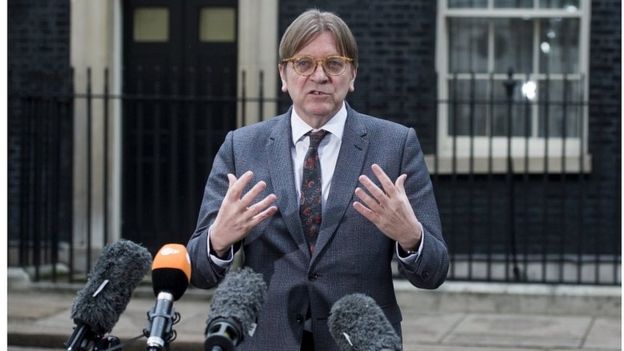
Donald Tusk has insisted the EU "does not want to build a wall", but Brexit means "we will be drifting apart".
The EU Council president said Theresa May wanted to "demonstrate at any price that Brexit could be a success", but that was not the EU's objective.
He was unveiling draft guidelines for the EU side for negotiations on post-Brexit relations with the UK.
Mr Tusk said the EU wanted an "ambitious and advanced" free trade agreement with zero tariffs on goods.
But, he added: "Our agreement will not make trade between the UK and EU frictionless or smoother.
"It will make it more complicated and costly than today for all of us. This is the essence of Brexit."
He said it would be the first time in history that a free trade agreement would "loosen, not strengthen economic ties".
Donald Tusk unveiled his guidelines in a picture-perfect castle in the hills outside Luxembourg.
A nice change to the usual venues in Brussels but the same tough message from the EU that the UK's red lines limit what it can get from the final Brexit deal.
The best that's on offer is a free trade agreement on goods with no tariffs, and access to the European markets for the UK service sector - but under EU rules and with no specific mention of financial services.
I asked a sad-sounding Donald Tusk if his offer came anywhere close to what the prime minister had asked for in her Mansion House speech. His pause was epically long, which suggested he knows it is not.
His document is also pretty gloomy, with a spine-chilling warning about the economic costs to the UK.
But there is also a big offer tucked away in a later paragraph - there are other options available if the government is prepared to compromise on its red lines.
Mr Tusk said he wanted continued security and research cooperation and to ensure flights were not grounded - but he rejected any chance of what the EU calls UK "cherry picking" of single market membership for certain sectors.
The draft guidelines say existing fishing rights for EU vessels in UK waters will continue.
The leaders of the remaining 27 EU states must approve the plans at a Brussels summit on 22 March, setting the template for chief negotiator Michel Barnier for talks with the UK about their future relationship.
The UK is due to leave the EU at the end of March 2019, and both sides have said they would like a deal on their future relationship to be agreed by this autumn to allow time for parliaments to approve the deal before Brexit happens.
But the European Council "confirms its readiness to initiate work towards a free trade agreement (FTA), to be finalised and concluded once the UK is no longer a member state".
It adds: "Such an agreement cannot offer the same benefits as membership and cannot amount to participation in the single market or parts thereof."
It comes as Chancellor Philip Hammond calls for financial services to be included in any future trade agreement.
The EU's chief Brexit negotiator, Michel Barnier, has argued that such a deal had never been done before.
But Mr Hammond will say in a speech that the EU has in the past attempted similar agreements, such as in trade talks with the US and Canada.

The European Parliament's Guy Verhofstadt held talks on Tuesday in Downing Street
"If it could be done with Canada or the USA... it could be done with the UK," he will say.
"I am clear not only that it is possible to include financial services within a trade deal but that it is very much in our mutual interest to do so."
The EU draft guidelines contain no mention of financial services.
The BBC's Economics Editor Kamal Ahmed said the two sides appeared far apart but most people involved in the talks thought a deal was possible.
The European Parliament has stressed that its preferred option is for the UK to continue to be a member of the single market and customs union after Brexit, in a draft resolution, leaked to the Politico website.
The parliament does not have a formal role in the Brexit negotiations but does have a veto on the final deal.
The European Parliament document, which may be changed before it is adopted, says non-EU members - even if very closely aligned to the bloc - cannot expect the same rights and benefits as EU members.
It also warns that the UK's current "red lines" in Brexit talks "would lead to customs checks and verification which would affect global supply chains and manufacturing processes, even if tariff barriers can be avoided".
It says a "deep and comprehensive" trade deal, of the kind envisioned by Theresa May, must entail "a binding interpretation role" for the European Court of Justice.
MPs in Westminster are, meanwhile, set to debate a Plaid Cymru call for UK nationals to be allowed to keep their EU citizenship after Brexit.
Plaid said EU citizenship would give holders the right to travel, live, study and work anywhere in the EU even after the UK leaves next year.
A UK government spokesman said only citizens of EU member states could hold EU citizenship.